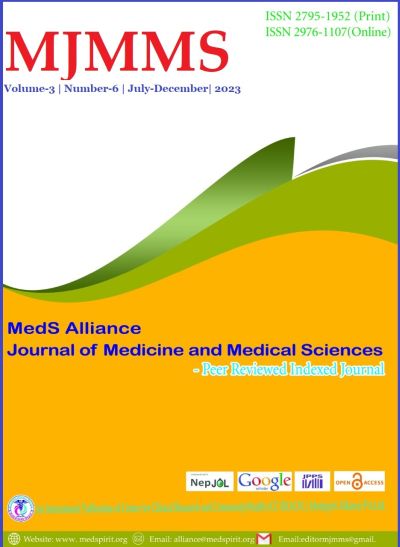Fostering Community Resilience: A Multi-dimensional Community Health Analysis and Evaluation in Aurahi Rural Municipality, Nepal
DOI:
https://doi.org/10.3126/mjmms.v3i6.66618Keywords:
Community health diagnosis, maternal and child health, nutritionAbstract
INTRODUCTION: Community health diagnosis is a crucial process for assessing the health status, identifying problems, available resources, and setting priorities for interventions within a community. This comprehensive assessment serves as a valuable data repository, guides program evaluation, policy formulation, and ensures community participation. The specific objectives of this study were to define health problems, identify resources, set planning priorities, implement and evaluate health actions, identify vulnerabilities, and explore social and environmental linkages to health in Aurahi Rural Municipality.
MATERIALS AND METHODS: A cross-sectional study using quantitative and qualitative methods was conducted in May-June 2022 by medical students across Aurahi’s 6 wards. Systematic random sampling selected 835 households. Data tools included questionnaires, checklists, anthropometry, and guides for interviews/focus groups. Primary data came from household surveys, interviews, focus groups, and observations.
RESULTS: The population exhibited an expansive age structure with the largest 20-24 year group. Agriculture was the main occupation (43%). Major health problems were diarrhoea (92%), pneumonia (54%), tuberculosis (80%), hypertension (57%), anaemia (41%), scabies (67%), COVID-19 (98% knowledge). Maternal health challenges included adolescent marriages (50% at 15-18 years), home deliveries (46%), low antenatal care visits (<4 times, 33%), inadequate breastfeeding practices (45% not providing colostrum). Child malnutrition was 6% moderately malnourished, 3% severely malnourished. Family planning awareness was 60%, utilization 37%.
CONCLUSION: Aurahi Municipality confronts critical sanitation, nutrition, maternal/child health, and family planning challenges necessitating community-focused, multi- sectoral actions. Initiatives promoting handwashing/ORS, school health education, and adolescent health awareness were initial steps, but sustained efforts through engagement and collaboration are crucial for lasting improvements in this rural population’s well-being.
Downloads
Downloads
Published
How to Cite
Issue
Section
License

This work is licensed under a Creative Commons Attribution-NonCommercial 4.0 International License.




